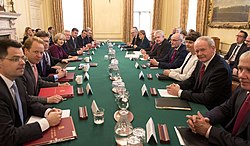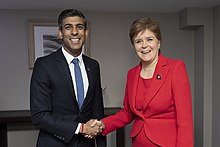Intergovernmental relations in the United Kingdom
 The UK Prime Minister chairs a Joint Ministerial Committee meeting at 10 Downing Street | |
| Abbreviation | IGR[1] |
|---|---|
| Predecessor | Joint Ministerial Committee |
| Formation | 1 July 1999 (as JMC)[2] 2022 (as Three Tier System) |
| Type | Intergovernmental organisation |
Membership | 4: United Kingdom Scotland Wales Northern Ireland |
Main organ | Prime Minister and Heads of Devolved Governments Council |
| Website | GOV.UK (Cabinet Office): Intergovernmental Relations |
| This article is part of a series on |
| Politics of the United Kingdom |
|---|
 |
|
|
In the United Kingdom, intergovernmental relations are the coordination and engagement between the central UK Government and the devolved Scottish Government, Welsh Government and Northern Ireland Executive.[3] The Prime Minister and Heads of Devolved Governments Council is where the heads of these administrations meet.[4]
There is also a portfolio-specific Interministerial Standing Committee (IMSC) and interministerial groups (IMG) affiliated to the IMSC. These were established in 2022 following a series of reviews.[1][5] From 1999–2022, their predecessor the Joint Ministerial Committee (JMC), established by memorandums of understanding, served a similar purpose.
Background
Intergovernmental relations were previously governed by the Joint Ministerial Committee.[6] On 20 January 2020, the Constitution Committee within the House of Lords published a report outlining how the UK Government could improve intergovernmental relations.[7] In 2022, the UK Government and devolved governments came to an agreement on the intergovernmental relations in the UK.[8][9]
Tiered governance (2022–present)
Prime Minister and Devolved Heads of Government Council

The Prime Minister and Devolved heads of Government Council (“the council”) consist of the Prime minister and the Devolved heads of Governments, the council is responsible for:
- Discussing UK level policies that require cooperation
- Overseeing the other government organisations and mechanisms within the other tiers.
- Acting as final arbiter for the UK dispute resolution mechanism.[10]
| Prime Minister and Devolved heads of Government Council | ||
|---|---|---|
| Name | Representing | Council Position |
| Keir Starmer | Chair | |
| John Swinney | Member | |
| Vaughan Gething | Member | |
| Michelle O'Neill Emma Little-Pengelly |
Northern Ireland | Member |
Meetings
Prime Minister and Head of Devolved Governments Council
| Meeting date | Location |
|---|---|
| 10 November 2022 | Blackpool |
Interministerial Standing Committees
The Interministerial Standing Committee is led by the Minister for Intergovernmental Relations and is responsible for discussing areas of cooperation that cannot be discussed at the Portfolio Committee, the committee will have representatives from central government and the three devolved nations and aim to meet monthly.[11]
There are currently two active intergovernmental committees.[12]
| No | Name of Interministerial Standing Committee |
|---|---|
| 1. | Interministerial |
| 2. | Finance |
Interministerial Groups
There are currently 7 active intergovernmental groups[12]
| No | Name of Intergovernmental Group |
|---|---|
| 1. | Business and Industry |
| 2. | Education |
| 3. | UK•EU Relations |
| 4. | Elections and Registration |
| 5. | Environment, Food, and Rural Affairs |
| 6. | Housing, Communities, and Local Government |
| 7. | COP26 |
Dispute resolution mechanism
There are six different mechanisms involved in intergovernmental relations in order to avoid disputes between the UK Government and the Scottish Government, Welsh Government and the Northern Ireland Executive.[13] Whilst the Scottish Government and Welsh Government welcomed the changes to intergovernmental relations within the United Kingdom which were implemented in 2022, both governments were critical regarding the UK Government's "attitude towards engagement with the devolved administrations at times".[14]
The review into intergovernmental relations concluded that the governments of the United Kingdom, Scotland, Wales and Northern Ireland were “committed to promoting collaboration and the avoidance of disagreements". In any instance that a dispute between any government arises, the IGR Secretariat may have that matter referred to them by the government or governments involved.[15]
The IGR Council is the final arbiter in any disputes.[16][failed verification]
Council of Nations and Regions
The Council of the Nations and Regions is a body that brings together the Prime Minister of the United Kingdom, Deputy Prime Minister of the United Kingdom, First Minister of Scotland, First Minister of Wales, First and deputy First Minister of Northern Ireland, Mayor of London and the mayors of combined authorities in England.[17]
Joint Ministerial Committee (1999–2022)
The JMC was created in 1999 by Tony Blair's Labour government,[2] and sought to act as a focus for the coordination of the relationships between these administrations. The terms of reference for the JMC were:[18]
- To consider non-devolved matters which impinge on devolved responsibilities, and devolved matters which impinge on non-devolved responsibilities.
- Where the UK government and the devolved administrations so agree, to consider devolved matters if it is beneficial to discuss their respective treatment in different parts of the UK.
- To keep the arrangements for liaison between the UK government and the devolved administrations under review.
- To consider disputes between the administrations.
Membership
Before it was replaced, the membership of the JMC Plenary (JMC(P)) was:
- Prime Minister and Minister for the Union, who acts as chair of the JMC.
- Secretary of State for Levelling Up, Housing and Communities, Minister for Intergovernmental Relations
- First Minister of Scotland
- First Minister of Wales
- First Minister and deputy First Minister of Northern Ireland[19]
The following may also attend sessions of the JMC:
- Deputy Prime Minister of the United Kingdom or First Secretary of State (if in office)
- The Secretary of State for Foreign and Commonwealth Affairs
- The secretaries of state for Scotland, Wales and Northern Ireland.
- Other Secretaries of State when issues relating to their remit are discussed.
Meetings
Since its creation in 1999, there had been several different JMC meeting formats.[2] Since 2010, there have been four types: plenary, Europe, domestic and European negotiations (created following the 2016 United Kingdom European Union membership referendum[20][21]).
The JMC Plenary meetings were intended to occur at least once every year. However, no plenary meetings were held between 2002 and 2008.[2] This was primarily because the UK, Scotland, and Wales governments were all controlled by the Labour Party, and as such ministers from the central and devolved governments could quickly and easily use informal links to coordinate policy.[22] However, following the Scottish National Party's victory at the 2007 Scottish Parliament election this was no longer the case. So JMC Plenary meetings were re-established, though on an ad hoc basis.[2]
Under proposals outlined by Theresa May in October 2016, the JMC Plenary was to meet on a definite annual basis and would have rotated between London, Edinburgh, Cardiff and Belfast. It would have also published an annual report on its work and hoped to foster greater formal and informal links between ministers from each (devolved) government.[23][24] However, these proposals were vetoed by Sinn Féin's Martin McGuinness.[23]
The last JMC Plenary was convened by Theresa May on 19 December 2018, even though soon after he became Prime Minister in July 2019, Boris Johnson announced his intention to hold a JMC Plenary meeting as soon as possible.[25]
See also
- Council of Nations and Regions, which brings the leaders of the UK and devolved governments together with directly elected mayors
- Interparliamentary Forum, which includes members of the UK parliament and the devolved legislatures Scotland, Wales and Northern Ireland
- British–Irish Council, which includes the British and Irish Governments, the Devolved Governments of Scotland, Wales and Northern Ireland, and the Crown Dependencies
- British–Irish Parliamentary Assembly
- North/South Ministerial Council
- North/South Inter-Parliamentary Association
- East–West Council
- UK–Overseas Territories Joint Ministerial Council
- Similar bodies in other countries
- Conference of Ministers-President, a similar body in Germany
- Council of Australian Governments, a similar body in Australia
- European Council – Council of the European Union – General Affairs Council
- First Ministers' conference and the Council of the Federation, similar bodies in Canada
- Minister for Intergovernmental Relations
- Ministerial council (disambiguation)
- National Governors Association, a similar body in the United States of America
References and notes
- ^ a b "Review of intergovernmental relations (HTML)". GOV.UK.
- ^ a b c d e "Devolution: Joint Ministerial Committee | The Institute for Government". www.instituteforgovernment.org.uk. 11 December 2017.
- ^ Paun, Akash; Henderson, Duncan (4 November 2022). "Intergovernmental relations". Institute for Government.
- ^ "Prime Minister and Heads of Devolved Governments Council communiqué 10 November 2022". GOV.UK. Retrieved 29 November 2022.
- ^ "Dunlop review (November 2019)" (PDF).
- ^ Paun, Akash; Sargeant, Jess; Shuttleworth, Kelly (1 July 2020). "Devolution: Joint Ministerial Committee". Institute for Government.
- ^ "Lords committee calls for revitalised United Kingdom". Scottish Legal News. 20 January 2022.
- ^ "Intergovernmental Relations (IGR) Review aims to strengthen relations between central government and devolved administrations". The Irish News. 14 January 2022.
- ^ "Boris Johnson to chair council of UK's devolved administration leaders". Peeblesshire News. 13 January 2022.
- ^ Pooran, Neil (13 January 2022). "Boris Johnson to chair council of UK's devolved administration leaders". Belfast Telegraph.
- ^ "New forum for talks between leaders from across UK". BBC News. 13 January 2022.
- ^ a b Paun, Akash; Henderson, Duncan (14 November 2022). "Timeline of known IGR committee meetings since the IGR review". Institute for Government.
- ^ "The review of intergovernmental relations" (PDF). UK Government. Retrieved 2 April 2024.
- ^ "ntergovernmental relations within the UK". House of Lords Library. Retrieved 2 April 2024.
- ^ "ntergovernmental relations within the UK". House of Lords Library. Retrieved 2 April 2024.
- ^ Henderson, Paun; Duncan, Akash (14 November 2022). "How the UK and devolved governments resolve disputes". Institute for Government.
- ^ https://www.bbc.co.uk/news/live/czk0r339evgt?post=asset%3Aa8e62d09-6eac-4575-9e2b-0bcf4cc8c0f0#post
- ^ "Devolution of powers to Scotland, Wales and Northern Ireland". GOV.UK. 8 May 2019.
- ^ "DUP: NI First Minister Paul Givan announces resignation". BBC News. 3 February 2022. Retrieved 3 February 2022.
- ^ "Joint Ministerial Committee (Plenary) communiqué: 30 January 2017". GOV.UK.
- ^ "Brexit: DUP and Sinn Féin attend Theresa May meeting". BBC News. 30 January 2017. Retrieved 30 January 2017.
- ^ June Burnham, Fragmentation and Central Control: Competing Forces in a Disunited Kingdom. In Jose Ruano and Marius Profiroiu (ed.), The Palgrave Handbook of Decentralisation in Europe, 2017, ISBN 978-3-319-32437-1, p. 144
- ^ a b "Union at the Crossroads: Can the British state handle the challenges of devolution? by Michael Kenny, Philip Rycroft and Jack Sheldon". The Constitution Society. 12 April 2021.
- ^ "Theresa May calls for 'grown-up' UK and Wales relations". BBC News. 23 October 2016.
- ^ "PM meeting with First Minister Nicola Sturgeon: 29 July 2019". 29 July 2019.


